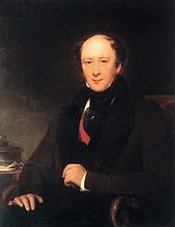(1796–1880)
James Robinson Planché was an English dramatist, librettist, antiquarian and costume historian, as well as one of the most significant representatives of early Victorian melodrama. His ancestors were French Huguenots who sought refuge in England.
His career as a playwright started with Amoroso, King of Little Britain (1818), which he created for an amateur theatre. Fame came with the melodrama The Vampire, or The Bride of the Isles (1820). Shortly afterwards, in 1821, he became a writer for the Adelphi Theatre, and later for Covent Garden, where he also reformed the historically inaccurate costumes used in performing the works of Shakespeare. In 1825, he introduced London to the genre of the revue, based on the French model. In 1826, he wrote the libretto for Carl Maria von Weber's opera Oberon, which exhibited heavy influence from Shakespeare. Later on, when developing the 1860 Italian translation, he revised the text. He also worked for the Theatre Royal Drury Lane, the Olympic Theatre and the Theatre Royal Haymarket.
Many of his stage plays drew from unusual historical and mythical subjects, and his contribution to English melodrama and other popular dramatic genres (burlesque, pantomime and farce) was significant. In addition to this, he wrote spoken theatre pieces based on the plots to operas by Mozart, Auber, Rossini and others. In 1838, he wrote a historical libretto for Felix Mendelssohn, but the composer later rejected it.
His oeuvre – comprising his own pieces, adaptations and translations – comes to almost 200 dramatic works. In addition, Planché was a pioneer in the creation of realistic stage sets and took an active role in the cause of copyright protection for dramatic works. Later on, his focus expanded to include theatrical costumes, regarding which he carried out extensive historical research, eventually publishing his book History of British Costume.
James Robinson Planché was an English dramatist, librettist, antiquarian and costume historian, as well as one of the most significant representatives of early Victorian melodrama. His ancestors were French Huguenots who sought refuge in England.
His career as a playwright started with Amoroso, King of Little Britain (1818), which he created for an amateur theatre. Fame came with the melodrama The Vampire, or The Bride of the Isles (1820). Shortly afterwards, in 1821, he became a writer for the Adelphi Theatre, and later for Covent Garden, where he also reformed the historically inaccurate costumes used in performing the works of Shakespeare. In 1825, he introduced London to the genre of the revue, based on the French model. In 1826, he wrote the libretto for Carl Maria von Weber's opera Oberon, which exhibited heavy influence from Shakespeare. Later on, when developing the 1860 Italian translation, he revised the text. He also worked for the Theatre Royal Drury Lane, the Olympic Theatre and the Theatre Royal Haymarket.
Many of his stage plays drew from unusual historical and mythical subjects, and his contribution to English melodrama and other popular dramatic genres (burlesque, pantomime and farce) was significant. In addition to this, he wrote spoken theatre pieces based on the plots to operas by Mozart, Auber, Rossini and others. In 1838, he wrote a historical libretto for Felix Mendelssohn, but the composer later rejected it.
His oeuvre – comprising his own pieces, adaptations and translations – comes to almost 200 dramatic works. In addition, Planché was a pioneer in the creation of realistic stage sets and took an active role in the cause of copyright protection for dramatic works. Later on, his focus expanded to include theatrical costumes, regarding which he carried out extensive historical research, eventually publishing his book History of British Costume.
